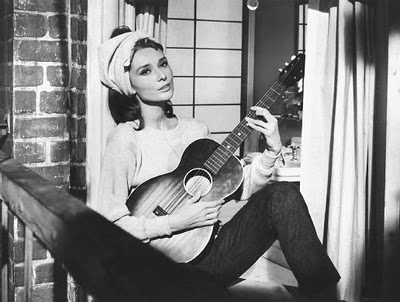

"Moon River" is a song composed by Johnny Mercer (lyrics) and Henry Mancini (music) in 1961, for whom it won that year's Academy Award for Best Original Song.It was originally sung in the movie Breakfast at Tiffany's by Audrey Hepburn,although it has been covered by many other artists. The song also won the 1962 Grammy Award for Record of the Year. It became the theme song for Andy Williams, who first recorded it in 1961 and performed it at the Academy Awards ceremonies in 1962. He sang the first eight bars at the beginning of his television show and also named his production company and venue in Branson, Missouri after it. Williams' version was disliked by Cadence Records president Archie Bleyer, who believed it had little or no appeal to teenagers.Andy Williams' version never charted, except as an LP track, which he recorded for Columbia in a hit album of 1962. The success of the song was responsible for re-launching Mercer's career as a songwriter, which had stalled in the mid-1950s because rock and roll replaced jazz standards as the popular music of the time. An inlet near Savannah, Georgia, Johnny Mercer's hometown, was named Moon River in honor of him and this song. The popularity of the song is such that it has been used as a test sample in a study on people's memories of popular songs. Comments about the song have noted that it is particularly reminiscent of Mercer's youth in the Southern United States. Mercer and Mancini wrote the song for Audrey Hepburn to fit her vocal range. Initially, the lyrics started, "I'm Holly, like I want to be / like Holly on a tree back home ..."; however, they were later changed to fit the theme of the film Breakfast at Tiffany's. Although an instrumental version is played over the film's opening titles, the lyrics are first heard in a scene where Paul "Fred" Varjak (George Peppard) discovers Holly Golightly (Hepburn) singing them, accompanied by her guitar, on the fire escape outside their apartments. There was an eruption of much behind-the-scenes consternation when a Paramount Pictures executive, Martin Rackin, suggested deleting the song from the film immediately after a very successful San Francisco preview. Hepburn's reaction was described by Mancini and others in degrees varying from her saying "over my dead body" to her using somewhat more colorful language to make the same point.[5] Hepburn's version was not included in the original movie soundtrack. Instead, an album version recorded by Mancini and his chorus was released as a single and became a number 11 hit. In different versions, Joel Whitburn's "Top Adult (Contemporary) Songs" reported the song as a #3 or #1 easy listening hit, due to unpublished charts in Billboard. Only months after Hepburn's death in 1993 her version was released on an album titled Music from the Films of Audrey Hepburn.